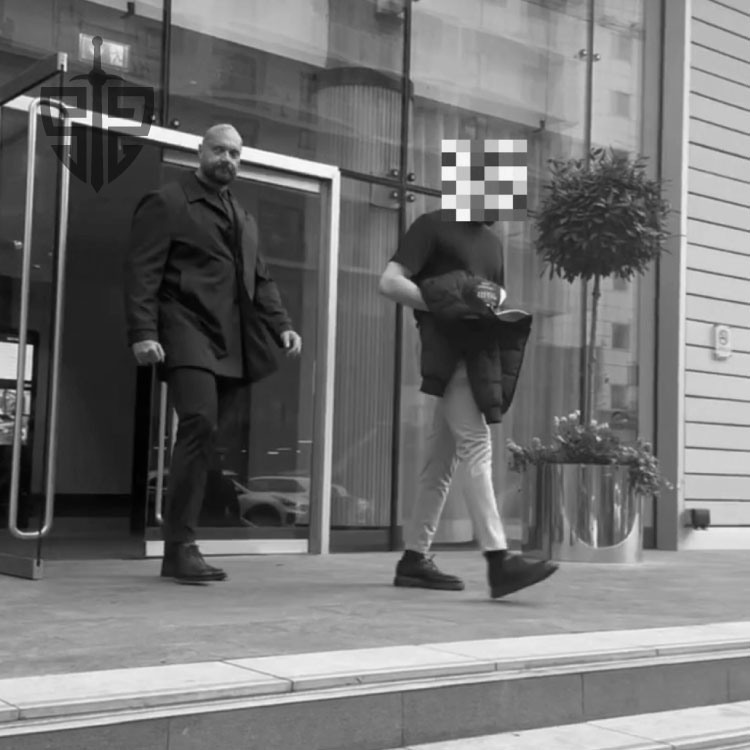
Close Protection
Safeguarding you in Leeds with skilled and discreet security experts.
Call Back Request
Enter a valid mobile number and a member of our team will give you a call.
Close Protection Services
We offer specialised close protection services in Leeds, tailored for individuals who may face heightened risks due to their profession or public profile.
Our close protection officers (CPOs) are highly skilled professionals dedicated to ensuring the safety and security of our clients.
The close protection process is centred on identifying and mitigating potential risks to client safety, such as threats of physical harm, harassment, or abduction.
Each close protection protocol is carefully designed to deliver comprehensive security, prioritising client well-being while adapting to specific circumstances, individual needs, and changing threat levels.
Personal Protection Protocols
- 1. Risk Assessment: Performing an in-depth analysis of potential threats and vulnerabilities that could impact client safety, factoring in elements such as their profile, activities, and environment.
- 2. Advance Planning: Developing comprehensive plans for the client’s movements and engagements, including route analysis, venue security assessments, and coordination with key contacts.
- 3. Security Measures: Implementing protective measures to address identified risks, such as physical barriers, access control systems, and surveillance equipment.
- 4. Communication: Establishing secure and efficient communication channels between the security team, the client, and key contacts to ensure effective coordination and response in emergencies.
- 5. Personal Protection Techniques: Utilising specialised techniques for close protection, including protective formations, surveillance detection, and defensive driving.
- 6. Emergency Response: Preparing and practising response plans for emergencies, including medical situations, hostile threats, or security breaches, to ensure quick and safe evacuation.
- 7. Continuous Assessment: Continuously assessing the security landscape and adjusting protocols as circumstances, emerging threats, or insights from previous operations dictate.
Close protection protocols are carefully crafted to provide a structured, proactive approach to security, allowing operatives to manage risks effectively and deliver exceptional protection.
Roles and Responsibilities
- Team Lead (TL) plays a vital role within an organisation, overseeing and coordinating team activities to ensure the successful completion of projects or tasks. read more
- Second-in-Command (2IC) is a crucial role within an organisation, typically acting as the primary support to the leader or manager. read more
- Personal Protection Officer (PPO), also known as a bodyguard or personal protection operative, is a highly trained security professional responsible for protecting individuals, usually those who are high-profile or at risk. read more
- Personal Escort Section (PES) is a specialised security service focused on providing personal protection and escorting high-profile individuals, dignitaries, or VIPs across diverse environments and situations. Personal Escort Services (PES) teams, made up of highly trained security professionals, ensure the safety, security, and seamless transportation of clients between locations. read more
- Security Advance Party (SAP) is a specialised team within a security detail responsible for conducting advance reconnaissance and implementing security measures for a particular event, operation, or VIP visit. read more
- Residential Security Team (RST) is a specialised unit dedicated to protecting individuals, families, or properties within residential environments. read more
- Quick Response Force (QRF) is a specialised unit within a security or military organisation responsible for swiftly responding to emergencies, threats, or incidents as they arise. read more
- Security Drive (SD) is a specialised security operation that utilises mobile patrols to monitor and secure a specific area or route. read more
- Personal Protection Medic (CPM) is a specialised security expert skilled in both personal protection and emergency medical care. They provide personal protection services while also offering immediate medical assistance to clients in high-risk environments or situations. read more
- Individual Bodyguard (BG) is a highly skilled security professional responsible for providing personalised protection to a specific individual, often referred to as the principal, client, or VIP (Very Important Person). read more

FAQs
- Q. What is close protection?
- Answer: Close protection, often referred to as personal protection or bodyguard services, focuses on safeguarding individuals who may face risks due to their public status, profession, financial standing, or other vulnerabilities. This service caters to high-profile individuals, including celebrities, politicians, and corporate executives. Its primary objective is to ensure their safety by evaluating threats, planning secure travel routes, and mitigating potential dangers.
- Q. Who typically requires close protection services?
- Answer: Close protection services are commonly required by individuals facing increased risks due to their status or activities. This includes politicians, celebrities, high-net-worth individuals, corporate executives, and occasionally private citizens involved in legal disputes or sensitive situations. Foreign dignitaries visiting potentially hostile areas also often depend on these services to maintain their safety.
- Q. What are the key responsibilities of a close protection officer (CPO)?
- Answer: A close protection officer's key responsibilities include assessing potential threats, planning and executing security strategies, escorting the client during travel, monitoring the environment for suspicious activities, and liaising with local authorities when necessary. The CPO must also be prepared to react swiftly and effectively to any immediate threats to the client’s safety.
- Q. What qualifications are required to become a close protection officer in the UK?
- Answer: In the UK, becoming a close protection officer requires obtaining a Security Industry Authority (SIA) licence. This entails completing an approved close protection training programme, which includes modules on risk assessment, surveillance awareness, conflict management, and emergency response. Applicants must also pass background checks and meet specific eligibility requirements, such as being at least 18 years of age.
- Q. How do close protection teams coordinate during an assignment?
- Answer: Close protection teams operate through meticulous planning and continuous communication. Their strategies include deploying advance parties to secure locations prior to the client’s arrival, maintaining consistent radio communication, and holding briefings to keep all team members informed of the client’s itinerary and potential threats. They also use secure communication systems and may collaborate with local law enforcement to strengthen security protocols.
Barry Bannon, Sheffield Wednesday Captain
I have used Saxon Risk Management's Managing Director, Craig, for the last three years whenever I needed personal protection. Now that Craig has put all his effort into this new company, we use them for our full-time RST (Residential Security Team). The Saxon team is extremely professional, and their skill sets are outstanding. I highly recommend Craig and Saxon to all my team and players I know around the UK. Thank YouSocial





